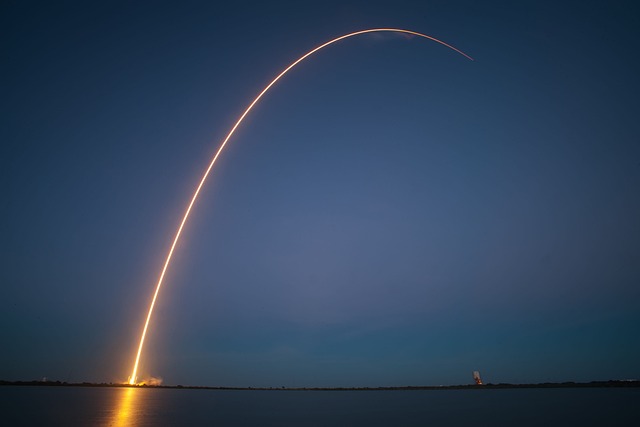
Space Launch Market Competition
Competition in the space launch market has been on the rise in recent years, with private companies like SpaceX and Blue Origin challenging traditional industry giants like United Launch Alliance (ULA). This competition has led to increased innovation and cost-efficiency in the space industry as companies strive to develop new technologies and methods to stay ahead of the competition. As a result, the space launch market has become a dynamic and rapidly evolving sector, with new players and technologies constantly emerging.
One of the key drivers of competition in the space launch market has been the emergence of private space companies like SpaceX, which have disrupted the traditional model of government-funded space programs. These companies have been able to develop new technologies and launch services at a faster pace and lower cost than traditional industry players, thanks to their innovative approaches and entrepreneurial spirit. This has put pressure on established players like ULA to adapt and evolve, leading to strategic changes and restructuring in the launch services sector.
Overall, the competition in the space launch market has been a positive development for the industry, driving innovation and cost-efficiency while also promoting the growth of new, privately owned space companies. As the sector continues to evolve, it will be interesting to see how traditional players like ULA respond to the challenges posed by new entrants like SpaceX, and how the industry as a whole adapts to the changing landscape of space launch services.
Overview of the Space Launch Market
The space launch market is a highly competitive industry that involves developing, manufacturing, and launching spacecraft into orbit and beyond. It is a rapidly growing market that has seen significant innovation and investment in recent years, driven by both private and government entities.
Launch Vehicles
Launch vehicles are the backbone of the space launch market, providing the necessary propulsion and control systems to lift spacecraft into orbit. These vehicles range in size and capability from small rockets designed to launch small satellites into low Earth orbit to heavy launch vehicles capable of carrying large payloads to the Moon and beyond.
In recent years, there has been a significant focus on the development of heavy launch vehicles capable of lifting larger payloads and reducing launch costs. This has led to the development of reusable launch vehicles, which can significantly reduce the cost of space launches by allowing the same rocket to be used multiple times.
Launch Services
Launch services are the services provided by launch vehicle manufacturers and operators to launch spacecraft into orbit. These services include everything from launch vehicle design and manufacture to launch site operations and mission planning.
The launch services market is highly competitive, with a number of major players vying for market share. SpaceX, for example, has disrupted the market with its reusable Falcon 9 rocket, which has significantly reduced the cost of space launches.
Launch Infrastructure
Launch infrastructure refers to the physical infrastructure required to support space launches, including launch sites, launch pads, and ground support equipment. This infrastructure is critical to the success of space launches and requires significant investment and maintenance.
In recent years, there has been a significant focus on the development of new launch infrastructure, particularly in emerging space nations such as India and China. This has led to increased competition in the market and has helped to drive down launch costs further.
Overall, the space launch market is highly competitive and rapidly evolving, driven by innovation and investment in launch vehicles, launch services, and launch infrastructure. As the space race heats up and more entities enter the market, it is likely that we will continue to see significant growth and development in this exciting field.
Key Players in the Space Launch Market
The space launch market is highly competitive, with several key players vying for market share. A few of the major players in the space launch market include:
SpaceX
SpaceX, founded by Elon Musk in 2002, has been making waves in the space launch market with its Falcon 9 rocket and Dragon spacecraft. The company has been successful in reducing the cost of launching payloads into space and has secured several contracts from government space agencies and commercial companies.
United Launch Alliance
United Launch Alliance (ULA) is a joint venture between Boeing and Lockheed Martin and has been a major player in the space launch market for almost two decades. The company’s Atlas V and Delta IV rockets have been used to launch satellites and payloads for the US government and commercial customers.
Boeing
Boeing is one of the largest aerospace companies in the world and has been involved in the space launch market for several decades. The company’s Delta IV rocket has been used to launch military and intelligence satellites, while its CST-100 Starliner spacecraft is being developed to transport astronauts to the International Space Station (ISS).
Arianespace
Arianespace is a European launch provider that operates the Ariane 5 and Vega rockets. The company is a consortium of several European companies and has been successful in launching commercial satellites into orbit.
Lockheed Martin
Lockheed Martin is a major aerospace and defense company that has been involved in the space launch market for several decades. The company’s Atlas V rocket has been used to launch military and intelligence satellites, while its Orion spacecraft is being developed to transport astronauts to the moon and beyond.
Northrop Grumman
Northrop Grumman is a major defense contractor that has been involved in the space launch market for several decades. The company’s Pegasus rocket has been used to launch small satellites, while its Antares rocket is being used to resupply the ISS.
Rocket Lab
Rocket Lab is a California-based launch provider. The company has successfully launched small satellites into orbit and secured several contracts from commercial customers.
Relativity Space
Relativity Space is a California-based launch provider that is developing a 3D-printed rocket called the Terran R. The company has secured several contracts from commercial customers and is aiming to reduce the cost of launching payloads into space.
Blue Origin
Blue Origin is a spaceflight company founded by Jeff Bezos in 2000. The company is developing the New Shepard spacecraft for suborbital tourism and the New Glenn rocket for orbital launches.
Competition in the Space Launch Market
The space launch market competition can be divided into two main categories: multi-provider competition and competition between countries.
Multi-Provider Competition
Multi-provider competition in the space launch market refers to the competition between private companies that offer launch services. This type of competition has become increasingly common in recent years, with companies such as SpaceX, Blue Origin, and Virgin Galactic entering the market.
Multi-provider competition has several advantages, including lower launch costs and increased innovation. It also allows for greater flexibility in terms of launch schedules and payload requirements. However, it can also lead to oversaturation of the market, with too many providers competing for too few customers.
US Market
The United States is one of the largest players in the space launch market, with both government and private entities involved in launches. The US government has historically been the largest customer for space launches, with the military and government space agencies accounting for a significant portion of launches.
In recent years, private companies such as SpaceX have entered the market, offering lower launch costs and increased innovation. Congress has also played a role in shaping the US space launch market, with legislation such as the Commercial Space Launch Competitiveness Act of 2015 aimed at promoting private sector involvement in space.
International Market
Competition in the international space launch market is fierce, with countries such as China, Russia, and the European Space Agency (ESA) vying for a share of the market. The International Space Station (ISS) is a major customer for space launches, with both government and private entities involved in supplying the station.
China has made significant strides in recent years, with the country’s space agency launching a record number of missions in recent years. The ESA has also been active in the space launch market, with the agency partnering with companies such as Arianespace for launch services.
Challenges and Opportunities in the Space Launch Market
The space launch market is rapidly evolving, with new challenges and opportunities emerging every day. This section will explore some of the most significant challenges and opportunities facing the space launch market, including cost reduction, space tourism, mining and exploration, satellite services, and telecommunications.
Cost Reduction
One of the most significant challenges facing the space launch market is the need to reduce launch costs. Historically, space launches have been incredibly expensive, with costs often exceeding hundreds of millions of dollars per launch. However, advances in technology and increased competition in the market have led to a significant reduction in launch costs in recent years. SpaceX has been at the forefront of this trend developing reusable rockets that can significantly reduce launch costs.
Space Tourism
A significant opportunity in the space launch market is the emergence of space tourism. Companies like Virgin Galactic and Blue Origin are developing spacecraft that can take paying customers into space for brief periods. While space tourism is still in its infancy, it has the potential to become a significant industry in the years to come.
Mining and Exploration
Mining and exploration are also significant opportunities in the space launch market. Companies like Planetary Resources are developing spacecraft and technologies that can mine resources from asteroids and other celestial bodies. These resources could be used to support space missions, as well as for commercial purposes on Earth.
Satellite Services
Satellite services are another significant opportunity in the space launch market. Companies like SpaceX and OneWeb are developing constellations of satellites that can provide internet services to remote areas of the world. These constellations could also be used for other purposes, such as navigation and communication.
Telecommunications
Telecommunications is another area of significant opportunity in the space launch market. Satellites are increasingly used for telecommunications, including voice, data, and video transmission. This trend is expected to continue in the years to come.
Final Thoughts
The intense competition in the space launch market is good as it has revolutionized the industry, paving the way for unprecedented innovation, cost-efficiency, and rapid growth. Private companies like SpaceX and Blue Origin have disrupted the traditional model of government-funded space programs, pushing the boundaries of what is possible in space exploration. Their entrepreneurial spirit and willingness to take risks have propelled the industry forward, inspiring traditional players like ULA to adapt and evolve.
This competition has not only led to the development of groundbreaking technologies but has also sparked a new era of space race and space exploration, with a multitude of new players and technologies constantly emerging. The introduction of reusable launch vehicles has dramatically reduced the cost of space launches, opening up opportunities for commercial space endeavors and paving the way for space tourism, mining, satellite services, and telecommunications.
Furthermore, the competition in the space launch market is not limited to individual companies. It extends to a global scale, with countries like the United States, China, Russia, and the European Space Agency vying for dominance. The international space launch market has become a hotbed of rivalry, with each nation striving to make significant strides in space exploration and secure its place among the stars.
As the space launch market continues to evolve, it will be fascinating to witness how traditional industry giants and new entrants respond to the challenges and opportunities that lie ahead. The potential for further cost reductions, advancements in technology, and the exploration of new frontiers holds tremendous promise for the future of space travel and our understanding of the universe.
In this age of intense competition, we stand at the threshold of a new era in space exploration, where humanity’s reach extends further than ever before. The final frontier beckons, and with the dynamic and rapidly evolving space launch market as our guide, we are poised to embark on extraordinary journeys that will expand our knowledge, inspire future generations, and unlock the mysteries of the cosmos. The stars are within our reach, and the possibilities are truly mind-blowing.





